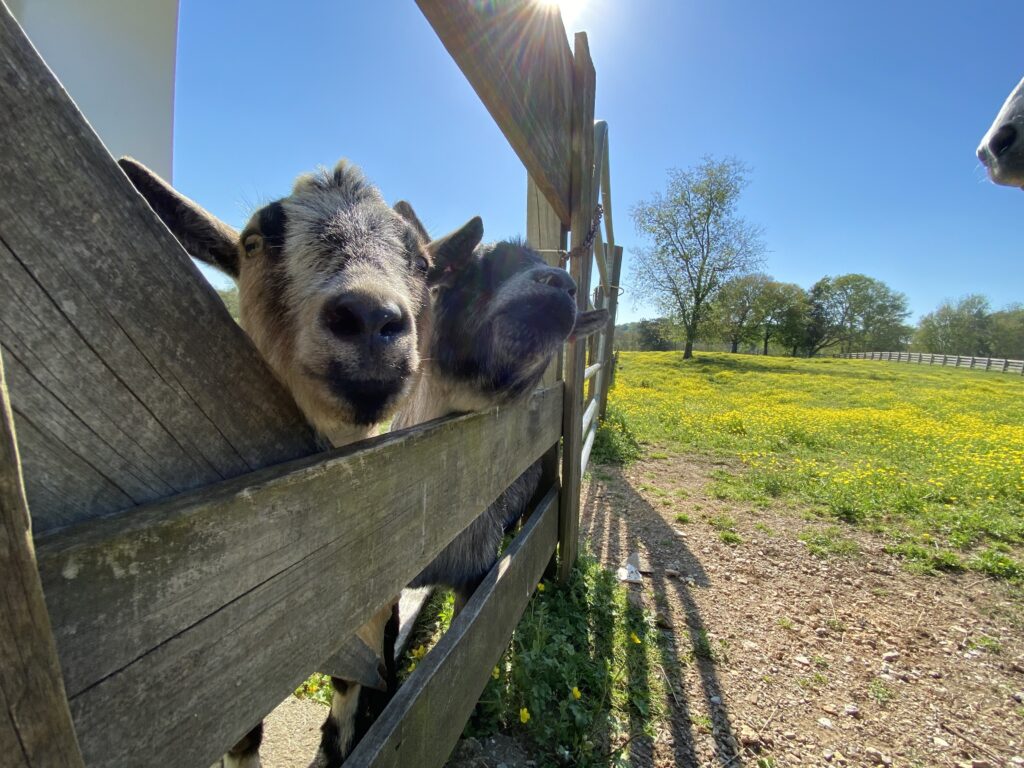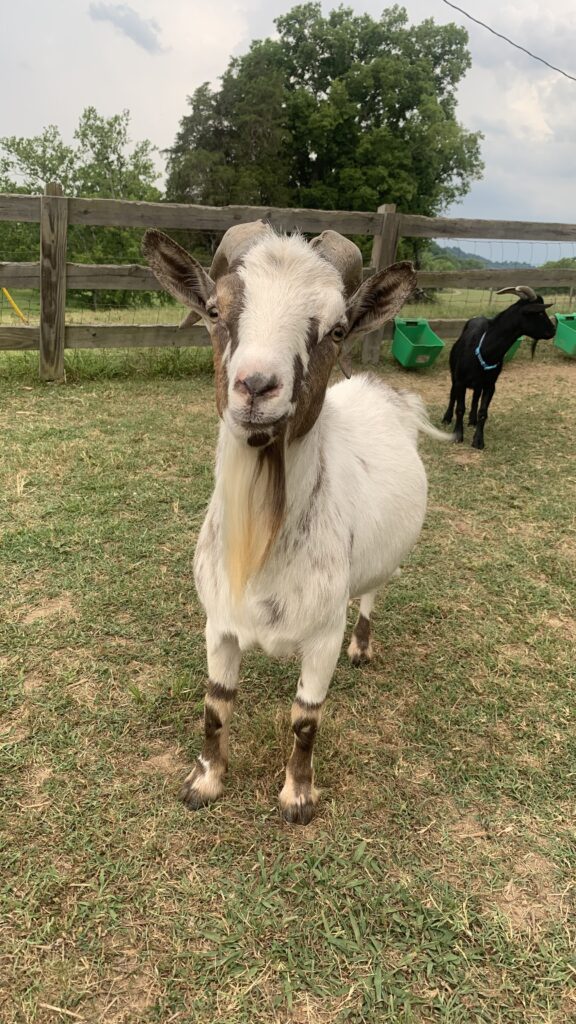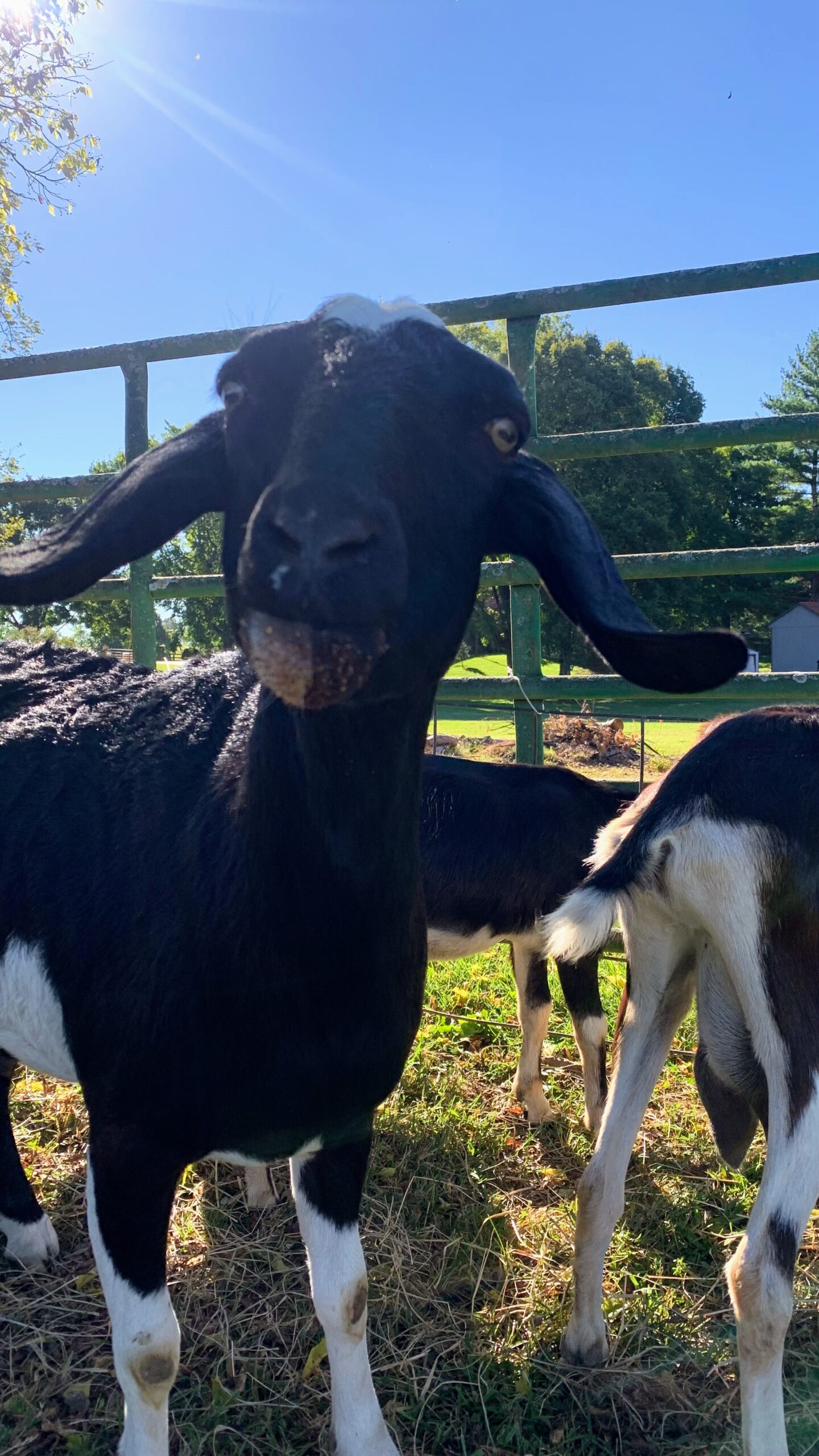
Preparing for the Responsibilities and Rewards of Goat Ownership
The Importance of Learning About Goats Before You Own Them!
If you take a stroll around our farm, you will notice that we currently have 13 goats, all with unique personalities and stories. With the exception of Jasper and Zepher, who are our therapy goats and farm ambassadors, all of our goats have been rescued and given a second chance at life here on the farm.
One thing you’ll quickly learn about goats is that they are incredibly curious and social animals. They love to explore, play, and of course, eat. Our goats can often be found munching on grass, hay, or even the occasional leaf from a nearby tree.
Goats are intelligent and curious animals that need mental and physical stimulation to stay healthy and happy. Providing them with a variety of activities, such as climbing on things, exploring new environments, and foraging for food, can help prevent boredom and reduce the likelihood of destructive behaviors. Additionally, allowing goats to engage in natural behaviors, such as grazing and browsing, can help improve their overall physical condition. Overall, providing goats with stimulating activities can improve their overall well-being and quality of life.
Goats are also incredibly hardworking animals. They are great at controlling weeds and clearing overgrown land. They are also popular as pack animals for hiking and camping. In fact, renowned animal behaviorist, Temple Grandin once said, “Goats are very smart and curious animals, they have a lot of personalities.”
People will often get baby goats because they are incredibly cute, and it’s true that they are adorable. However, it’s important to understand that raising goats comes with responsibilities. One important fact to keep in mind is that a goat kid, whether male or female, can become fertile at just 7 weeks old. While it’s not recommended to breed them at such a young age, it’s crucial to be aware that it’s possible. Additionally, intact bucks and does over 8 weeks of age should not be kept together as young bucks are capable of breeding at just 2 months old, even if they are related to them. This is why it is crucial to understand and learn as much as possible about the responsibilities and challenges of raising goats before taking the plunge.
When considering raising goats, it’s important to be aware of the responsibilities that come with it. Goats require proper nutrition, healthcare, and living conditions in order to thrive. They also require regular grooming and hoof care, as well as protection from predators and extreme weather. Additionally, it’s important to understand the reproductive biology of goats in order to ensure their health and well-being.
One important aspect of goat reproduction to be aware of is that a goat kid, whether male or female, can become fertile at just 7 weeks of age. This means that if you’re planning to raise goats, you’ll need to be prepared to separate males and females at a very young age. Intact bucks and does over 8 weeks of age should not be kept together, as young bucks are capable of breeding does at just 2 months old, even if they are related to them. This can lead to inbreeding and a host of health problems for the does and their kids.
Another important thing to consider is that goats are social animals and do best in groups, so it is not recommended to have just one goat unless you plan to give them a lot of human interaction. The saying goes that “goats are like chips, you can’t just have one.” They are also very active animals and will require a lot of space and appropriate fencing to graze and play.
Owning Goats
Owning goats can be a rewarding and enjoyable experience, but it’s important to understand the responsibilities and challenges that come with it. It is important to do research, learn as much as possible, and be prepared to provide proper care before bringing goats home.
Finding a mentor when raising goats can be crucial for both you and your herd. A mentor can help you navigate the complexities of goat ownership, from breeding and nutrition to health and emergency situations. But where do you find a mentor who can guide you through the ups and downs of goat raising? The answer is: there are many ways!
First, you can reach out to experts in the field such as veterinary teaching universities, local livestock or farm vets, and county agriculture extension agents. These professionals may not be the personal goat mentor you were hoping for, but they can provide valuable information and resources on health, property, and other goat-related issues.
Another option is to connect with local goat breeders and farmers. Many of them are more than happy to share their knowledge and experience with new goat owners. Joining local goat clubs and organizations can also be a great way to meet other goat owners and learn from their experiences.
Online communities and forums can also be a great resource for finding a goat mentor. There are many online groups dedicated to specific breeds or areas of goat ownership, where you can ask questions and receive guidance from experienced goat owners. Don’t forget, you can also find mentors all over the world via the internet, it’s a great way to find a mentor who can offer valuable advice and support.
Finding a reliable mentor and accessible veterinarian is crucial when raising goats. Unfortunately, we learned this the hard way when our therapy goat, Zepher, developed a painful urinary tract infection with kidney stones on Christmas Day. If we did not have an on-call vet, Zepher could have died from the infection. He needed several costly days in the vet hospital. This experience taught us the importance of being prepared for unexpected health issues and having a plan in place for emergency situations. It’s important to have a trusted veterinarian on call and to be familiar with the signs of serious health problems so that you can act quickly if necessary. It’s also important to budget for unexpected veterinary expenses as they can arise at any time. This is something to also consider when raising goats, as it can save you both time and money in the long run.
Having a goat mentor can be a lifesaver for you and your flock as you begin raising goats. With the help of an experienced mentor, you can gain valuable guidance and support as you navigate the world of goat raising. So, don’t be afraid to reach out and ask for help
From Companion to Commodity:
The Various Purposes of Owning a Goat
Owning a goat as a pet is different from owning a goat for other purposes such as milk or meat production. Goats used for these purposes require different care, management, and living conditions than those kept as pets. Additionally, owning an intact male or “buck” can be difficult, as they can become aggressive and territorial during the breeding season. This can make them difficult to handle and potentially dangerous for both people and other animals. Therefore, it is important to consider neutering or spaying your goats.
Unfortunately, many people purchase or adopt goats on a whim, without fully understanding the responsibilities that come with it. This is why many goats end up being given up to animal sanctuaries like ours.
Different Goat Breeds:
Understanding the Unique Characteristics
There are many different breeds of goats, each with its own unique characteristics. Some of the most common breeds include:
- Alpine: This is a medium to large-sized breed that is known for its high milk production. They have a straight profile and come in a variety of colors.
- Nubian: This is a large breed that is known for its high butterfat content in its milk. They have long, drooping ears and come in a variety of colors. They are known to be friendly and affectionate, making them a good choice as pets.
- LaMancha: This is a medium-sized breed that is known for its high milk production. They have a distinct “gopher” ear, which is very small or missing ear pinnae. They are known for their gentle temperament, making them a good choice as pets.
- Oberhasli: This is a medium-sized breed that is known for its high milk production and gentle temperament. They are typically bay in color with black markings. They are known for their friendly and docile nature, making them a good choice as pets.
- Saanen: This is a large breed that is known for its high milk production. They are typically white or light cream in color. They are known for their calm and friendly nature, making them a good choice as pets.
- Toggenburg: This is a medium-sized breed that is known for its high milk production and hardiness. They are typically dark brown with white markings.
- Boer: This is a large breed that is known for its high meat production. They are typically white with red or brown heads.
- Tennessee Fainting Goat: This is a small breed that is known for its muscle tone and unique ability to stiffen or “faint” when startled. They come in a variety of colors. They are known to be friendly and hardy, making them a good choice as pets.
- Pygmy: This is a small breed that is known for its hardiness, good milk production, and friendly temperament. They are typically smaller in size and come in a variety of colors. They are known for their friendly and affectionate nature, making them a good choice as pets.
- Nigerian Dwarf: This is a small breed that is known for its high milk production, proportionate to its size. They are known for their friendly and affectionate nature, making them a good choice as pets. They come in a variety of colors and patterns.
It’s worth noting that while some breeds are known to have friendly and docile nature, they can be trained to be friendly and affectionate if raised and socialized properly.
The Benefits of Goat Ownership:
Don’t be Discouraged
“This post is not meant to discourage you, but rather to inform you of the many amazing benefits that come with owning goats. Whether you’re interested in using them for milk, meat, fiber, or simply as companions, there are countless reasons to consider adding goats to your homestead or farm.

For Example:
- Companionship: Goats are social animals and thrive in the company of other goats or humans. They can make great companions and can provide a sense of joy and entertainment.
- Weed Control: Goats are natural foragers and can help control weeds on your property. They will happily munch on weeds, bushes, and even small trees, helping to keep your land clear and tidy.
- Milk Production: Many goat breeds are known for their milk production, making them a great source of fresh, healthy milk for your family.
- Meat Production: Goats are also a great source of meat. They are known for their lean, flavorful meat and are a popular choice for homesteaders and small farmers.
- Fiber Production: Some breeds of goats, such as cashmere and angora, produce high-quality fiber for use in clothing and other textiles.
- Great for Small Spaces: Goats are small and can be kept in smaller spaces than other farm animals, making them a great option for those with limited land.
- Low Maintenance: Goats are relatively low-maintenance animals, requiring less care and attention than other farm animals.
- Educational: Goats can be a great educational tool for children, teaching them about responsibility, caretaking, and the natural world.
- Low Carbon Footprint: Goats are a sustainable and environmentally friendly source of food and fiber. They can be raised on land that is not suitable for other forms of agriculture.
- Therapy: Goats have been used in therapy programs to help people with physical or mental disabilities, they are known to have a calming effect on people.
However, there are many reasons why goats are brought to our rescue, including neglect, abandonment, and lack of understanding of the responsibilities and challenges of raising goats.
Owning a goat can be a rewarding experience, but it is important to remember that they are living creatures that require proper care and attention. Before deciding to own a goat, it is important to research the different breeds and their specific needs, including dietary requirements, living conditions, and necessary medical care. Additionally, it is important to consider the amount of time and commitment that you are able to give to the goat, as well as any local laws or regulations regarding goat ownership. Taking the time to properly research and prepare for owning a goat can help ensure that both you and the goat have a happy and healthy experience.
Expert Resources for Goat Ownership: Written Guides and Books
“When considering owning a goat, it’s important to do your research and consult with experts who have experience and knowledge in the field. Not only can you seek guidance from professionals such as veterinarians, goat breeders, 4-H leaders, extension agents, and local goat organizations, but many of these experts have also written books on the subject. These written guides provide in-depth information on the different breeds of goats, their health and nutrition needs, housing and fencing requirements, and more. Additionally, they can provide tips on breeding, and answer any questions you may have. These books can be a great resource to have on hand as you navigate the journey of goat ownership.
- Gail Bowman, is a well-known author and speaker on the subject of raising and caring for goats. She has written several books on the subject, including “Storey’s Guide to Raising Dairy Goats” and “Storey’s Guide to Raising Meat Goats.”
- Jerry Belanger, is a goat breeder and expert who has been raising and showing goats for over 30 years. He is the author of “The Goat Health Handbook” and offers consulting services to goat owners.
- Deborah Niemann, is a goat farmer, author, and speaker who has been raising goats for over 20 years. She is the author of “Homegrown Milk: The Insider’s Guide to Raising Dairy Animals” and “Raising Goats Naturally: The Complete Guide to Milk, Meat and More.”
- Dr. John Myers, is a veterinarian who specializes in small ruminant medicine and has extensive experience working with goats. He is the author of “Goat Medicine” and “Goat Health Care.”
